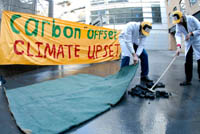Submitted by Bob Burton on
 The marketing of carbon offsets as a 'solution' to global warming is attracting criticism. The theory is that an individual or organization can pay a company to invest in renewable energy or tree planting projects to offset carbon emissions from travel or other activities. Speaking at a protest at the office of the UK-based The Carbon Neutral Company (TCNC), Sam Chase from London Rising Tide described offsetting as "a smokescreen". Carbon Trade Watch, a project of the Amsterdam-based Transnational Institute, recently released a report (pdf) critiquing offsets. "Offset companies give the idea that emissions are instantly 'neutralised' when in fact the supposed 'neutralisation' can take place over periods of up to a hundred years. Regular offsetting worsens the problem because the rate at which carbon emissions are 'neutralised' is far slower than the rate at which they are generated," warns Kevin Smith, the report's author.
The marketing of carbon offsets as a 'solution' to global warming is attracting criticism. The theory is that an individual or organization can pay a company to invest in renewable energy or tree planting projects to offset carbon emissions from travel or other activities. Speaking at a protest at the office of the UK-based The Carbon Neutral Company (TCNC), Sam Chase from London Rising Tide described offsetting as "a smokescreen". Carbon Trade Watch, a project of the Amsterdam-based Transnational Institute, recently released a report (pdf) critiquing offsets. "Offset companies give the idea that emissions are instantly 'neutralised' when in fact the supposed 'neutralisation' can take place over periods of up to a hundred years. Regular offsetting worsens the problem because the rate at which carbon emissions are 'neutralised' is far slower than the rate at which they are generated," warns Kevin Smith, the report's author.

Comments
rohitsethi replied on Permalink
Should we just wait for the perfect solution?
Carbon offset is surely not the ultimate solution to global warming problem, but then to wait indefinitely for a perfect solution will worsen the problem even further. Constructive criticism will help in improving the situation but to write off carbon offsetting completely will definitely not help the cause.
Climate change is not an overnight phenomenon but takes years before it shows its adverse effects, and no solution can improve the situation in one day. The good thing is we have started taking the problem more seriously because of the financial impacts it has on organizations.
Some of the methodologies mentioned in the Kyoto protocol for carbon offset are debatable and should be addressed asap, but the concept behind it, is a step in the right direction.
To clean the environment with the rate with which we are polluting it, is not an achievable goal. For us to make a positive impact on the environment, will require a complete change in mind set, and it’s not just the governments, but the people who need to be actively involved.
Rohit S
www.carbonfreezone.com